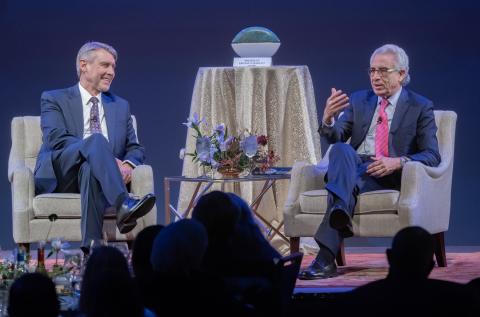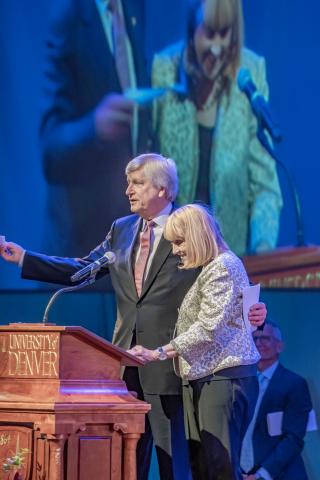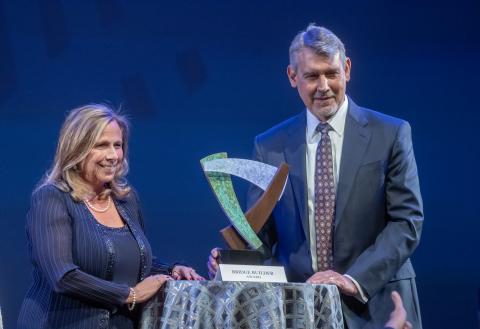Ernesto Zedillo Shares Thoughts on Democracy, Trade and Climate Change at 21st Korbel Dinner
The dinner also honored Barbara Bridges and Doug and Mary Scrivner
Former President of Mexico Ernesto Zedillo is worried about the current state of the global community. From climate change to drug policy to the breakdown of international trade agreements, the economist and Yale University academic sees much that troubles him. He shared his concerns and experiences with a captivated audience at the University of Denver’s 21st Korbel Dinner.
The Nov. 15 event, hosted by the Josef Korbel School of International Studies and staged at the Denver Center for the Performing Arts, benefited the school’s programs, scholarships and centers. Over the years, the Korbel Dinner has brought important figures in international relations and politics to Denver for candid discussions of pressing topics. Previous speakers have included then Vice President Joe Biden, former Secretary of State and DU alumna Condoleezza Rice and former Secretary of State John Kerry.
Zedillo served as president of Mexico from 1994–2000. During his term, he oversaw the implementation of the North American Free Trade Agreement and helped strengthen the country’s democratic election system.
Despite decades of reforms to the system before he took office, Zedillo said, “It was clear to me we were not there yet. … The big challenge was to undertake a reform that would allow the other parties to be competitive. … Then it was not going to be my will that determined the results of the election, but it was going to be the will of the people.” To that end, he helped level the playing field, which resulted in his party’s loss in the 2000 election.
Zedillo also offered commentary on another important democracy — the U.S. — and some of its recent policy decisions, including withdrawal from the Paris Climate Accords and the regression of free trade.
“We are seeing attempts to move from a system which has been based on rules: rules to interact, rules to address problems, rules to address controversies, rules to address differences, rules to solve issues,” Zedillo said of the U.S.’s evolving trade policy. “My very strong claim is that what’s being done is against the fundamental interest of the United States and the people of the United States.”
Zedillo also addressed the opioid crisis and the state of U.S. drug policy, saying he was encouraged by the efforts of some states to address drug use as a public health and human rights issue rather than as a criminal one.
“You have to decriminalize consumption, and you have to regulate the supply,” he advised. “”We regulate many things that are very dangerous in life. We regulate alcohol, we regulate cigarettes and by the way, we regulate thousands of medicines that can kill you.”
For his work in Mexico and around the world, Fritz Mayer, dean of the Korbel School, presented Zedillo with the University of Denver Global Leadership Award.
In addition to that award, the University presented two others. Prominent DU community members Doug (JD ’77) and Mary Scrivner received the Josef Korbel Humanitarian Award for their contributions to the University and beyond. “We are so grateful for the good fortune and success we have been blessed with,” Doug Scrivner said in his acceptance speech. “We believe it is appropriate for people who have such good fortune to share it with others.”
Barbara Bridges, founder of Denver’s Women + Film Festival, was presented with the University’s International Bridge Builder Award. In accepting the aptly named honor, she spoke of the importance of narrative: “Storytelling is central to human existence. It is common to every known culture over all eras in all parts of the world. And so the more we can learn about each other’s stories, the more we can understand each other personally or culturally.”
Cultivating that understanding, Mayer told the crowd of Korbel School supporters, is crucial to navigating this particular time in history: “We gather this evening at another pivotal moment in history—a time of rapid change and great uncertainty about the future. The mission of the Korbel School is more important than ever. That’s why we are so focused on the big issues of our time and the challenges of the next generation our students will be called upon to address.”





